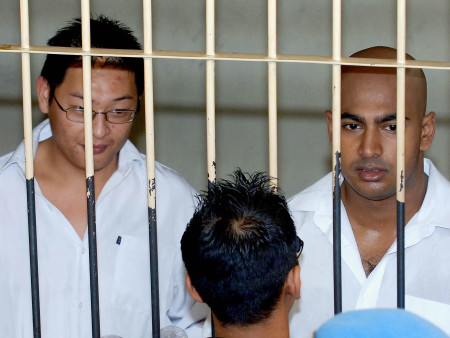An Indonesian government minister has threatened Australia with a “human tsunami” of 10,000 asylum seekers if Canberra continues to agitate for clemency for the death row pair Andrew Chan and Myuran Sukumaran.

Tedjo Edhy Purdijatno, the coordinating minister for political legal and security affairs, reminded the Abbott government that Indonesian cooperation was vital to the success of its “stop the boats” policy.
“If Canberra keeps doing things that displease Indonesia, Jakarta will surely let the illegal immigrants go to Australia,” Tedjo said in a speech on sovereignty delivered at a Javanese university, adding: “There are more than 10,000 [asylum seekers] in Indonesia today. If they are let go to Australia, it will be like a human tsunami.”
Chan and Sukumaran, Australians sentenced for trying to smuggle heroin out of Bali in 2005, have been moved to the prison island of Nusa Kambangan before their expected, imminent, execution.
Sir Richard Branson has joined the effort to save their lives. The Virgin founder, a member of the Global Commission on Drug Policy, told the Australian Broadcasting Corporation he was willing to go to Indonesia to help save their pair.
“What we would love to do is speak with the president of Indonesia and try to give them a way forward, a positive way forward for its country,” he said. “We have written to the president saying if he will have us we would love to come and talk … all we’re saying is there is a better approach.”
Tedjo is a former chief of staff of the Indonesian navy and has intimate knowledge of Indonesia’s efforts to stop asylum seeker boats. He has previously advocated isolating asylum seekers on a remote island in the archipelago nation.
The minister said Australia should respect Indonesia’s legal system and called the prisoner swap, proposed by Australia’s foreign minister, Julie Bishop, as a last-ditch attempt to save the Australian men’s lives, “unethical”.
And Tedjo said Indonesia was not worried by the threat of sanctions or trade restrictions. “Australia will in fact receive pressure domestically if it stops its livestock exports to Indonesia, since Indonesia is Australia’s main market.”
The conflation of the issue of asylum seekers with the execution of the Bali Nine drug smugglers is difficult diplomatic territory for Australia, which relies heavily on the cooperation – or at least the tacit acquiescence – of neighbouring countries to enforce its “stop the boats” policy.
Historically, Indonesia has been the transit country from which by far the largest number of asylum seekers have tried to reach Australia by boat. But Australia’s ‘turnback’ policy is deeply resented by many in the republic’s government.
Australia attracted significant opprobrium when its navy ships breached Indonesian territorial waters six times in two months in 2013 and 2014. It was forced into a humbling apology for the “miscalculation of Indonesian maritime boundaries”.
The new president, Joko Widodo, warned in an interview with Fairfax, even before he had taken office: “We will give a warning that this is not acceptable. We have international law, you must respect international law.”
Australia has forcibly turned back 429 asylum seekers in 15 boats since Operation Sovereign Borders began in December 2013, the majority of those to Indonesia. It either tows asylum seekers’ boats back to territorial waters, hands them over to authorities of the country to which they are being returned, or puts people into orange lifeboats with instructions on how to pilot the vessels back.
Last week Guardian Australia revealed Australia has signed a secretive “multi-million dollar” contract with a Vietnamese shipbuilder to build 10 “alternative transport vessels” resembling fishing boats in which to forcibly return asylum seekers.
The UN has long opposed Australia’s turnback policy, saying asylum seekers intercepted at sea should not be returned against their will to source and transit countries without proper on-land processing.
Criticised by another arm of the UN this week for breaching the convention against torture in the prosecution of its offshore processing policies, the prime minister, Tony Abbott, said Australians were “sick of being lectured to by the United Nations” on human rights and other breaches of international law. Source: The Guardian








